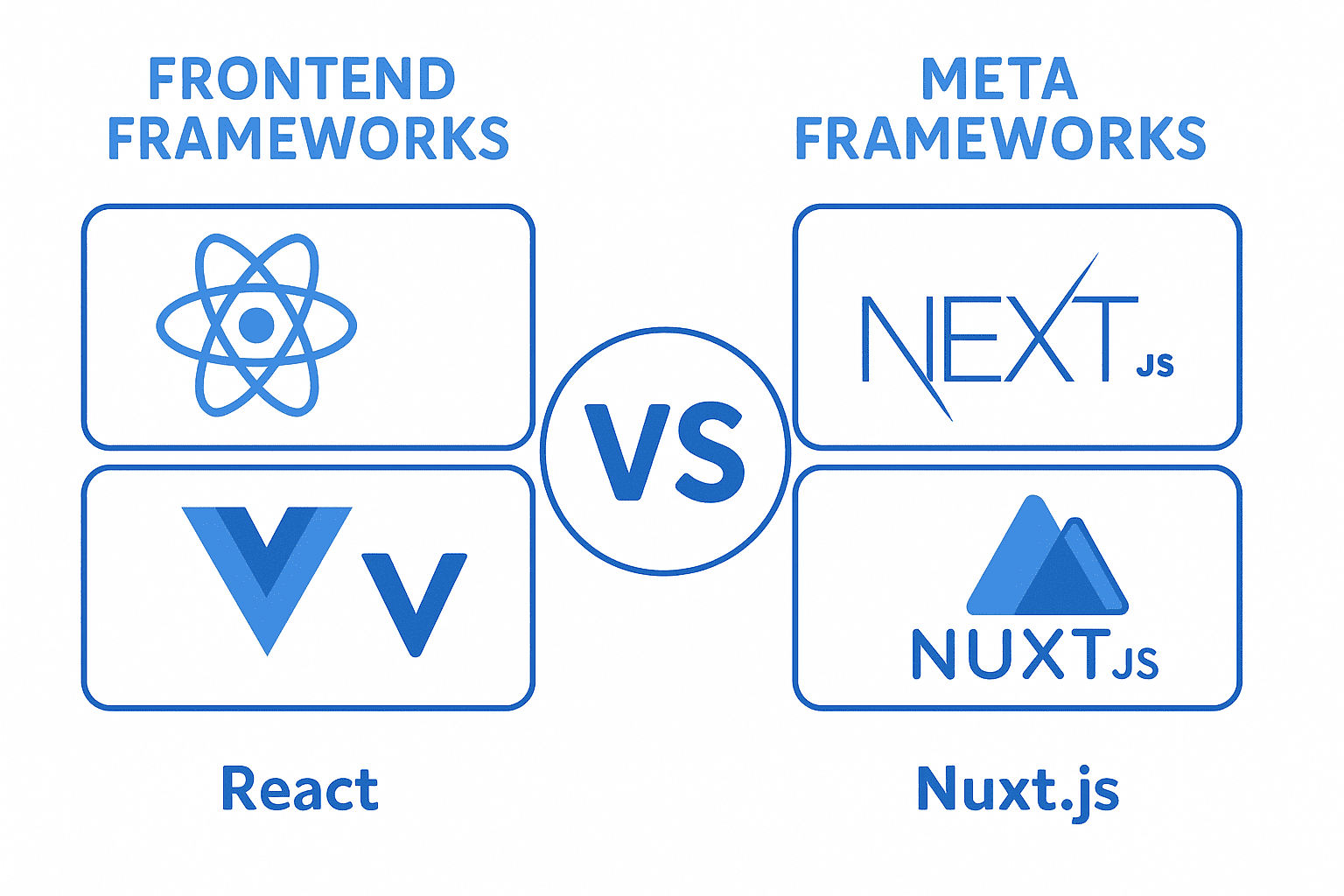In the ever-evolving world of frontend development, choosing the right tool for your project can make all the difference. While React and Vue.js have become the go-to frontend frameworks for building dynamic user interfaces, there’s another category of tools that’s gaining traction: meta frameworks like Next.js (built on React) and Nuxt.js (built on Vue). These meta frameworks offer additional features like server-side rendering (SSR), static site generation, and built-in routing—making them ideal for certain project types. Let’s break down the differences and help you decide when to use a frontend framework versus a meta framework.
Frontend Frameworks: React and Vue.js
What Are They?
Frontend frameworks like React (by Facebook) and Vue.js (by Evan You) are designed to build dynamic, single-page applications (SPAs). They focus on the user interface layer, allowing developers to create reusable components, manage state efficiently, and build responsive web experiences.
Key Features
- Component-based architecture: Build UIs from reusable pieces.
- State management: React uses tools like Redux or Context API; Vue has its own reactivity system.
- Virtual DOM: React’s virtual DOM optimizes rendering performance.
- Large ecosystems: Access to libraries, tools, and community support (e.g., React Router for routing).
When to Use React or Vue
- Single-Page Applications (SPAs): If your project doesn’t require SEO or server-side rendering, React or Vue are excellent choices.
- Dynamic UIs: For apps with complex interactions (e.g., dashboards, e-commerce platforms).
- Team Expertise: If your team is already familiar with React or Vue, leveraging their ecosystems can speed up development.
- Lightweight Projects: For smaller applications where performance isn’t a critical concern.
Example Use Cases:
- A real-time chat app using React’s state management.
- A simple blog with Vue.js components for posts and navigation.
Meta Frameworks: Next.js (React) & Nuxt.js (Vue)
What Are They?
Meta frameworks like Next.js (built on React) and Nuxt.js (built on Vue) are designed to simplify the development of full-stack applications. They combine the strengths of their underlying frameworks with features like server-side rendering (SSR), static site generation (SSG), and built-in routing.
Key Features
- SSR/SSG Support: Improve SEO and performance by rendering pages on the server.
- File-based Routing: Simplify navigation by using file names to define routes (e.g.,
pages/index.jsin Next.js). - Built-in APIs: Tools for API routes, image optimization, and form handling.
- Progressive Enhancement: Combine client-side interactivity with server-rendered content.
When to Use Next.js or Nuxt.js
- SEO-Critical Applications: If your app needs to rank well in search engines (e.g., e-commerce, content-heavy sites).
- Hybrid Applications: For projects that require both client-side interactivity and server-rendered content (e.g., a dashboard with dynamic data).
- Static Site Generation: To build fast, SEO-friendly static sites (e.g., portfolios, marketing pages).
- Full-Stack Development: If you want to handle both frontend and backend logic in one toolchain.
Example Use Cases:
- A marketing website using Nuxt.js for SSG and React components for interactive sections.
- A Next.js app with SSR to improve load times for a content-heavy blog.
Frontend Frameworks vs. Meta Frameworks: A Comparison
| Feature | Frontend Framework (React/Vue) | Meta Framework (Next.js/Nuxt.js) |
|---|---|---|
| Server-Side Rendering (SSR) | No (requires additional libraries) | Yes, out-of-the-box |
| Static Site Generation (SSG) | No (requires plugins) | Yes |
| Routing | Manual setup (e.g., React Router) | File-based routing |
| SEO Optimization | Requires extra effort (e.g., React Helmet) | Built-in support |
| Performance Gains | Depends on state management and third-party tools | Improved via SSR/SSG |
| Use Case | SPAs, lightweight apps | SEO-focused sites, hybrid apps |
When to Choose a Frontend Framework Over a Meta Framework
- Simple Single-Page Apps: If your app doesn’t need SSR or SEO, React or Vue alone might be faster to develop.
- Performance-Critical Projects: For lightweight apps where client-side rendering is sufficient.
- Team Familiarity: If your team has more experience with React or Vue than Next.js/Nuxt.
When to Opt for a Meta Framework
- SEO Requirements: If your site needs to rank well in search engines (e.g., news sites, product listings).
- Content-Heavy Sites: For blogs, documentation portals, or marketing pages that benefit from SSG.
- Full-Stack Development: If you want to build a single toolchain for frontend and backend (e.g., using Next.js with API routes).
- Improved Performance: For apps where SSR/SSG reduces load times and enhances user experience.
Considerations for Your Project
- Project Complexity: Meta frameworks add structure and tooling, which can be beneficial for larger projects.
- Performance Needs: SSR/SSG in meta frameworks often leads to better performance, especially for content-driven apps.
- Team Skill Set: Evaluate your team’s familiarity with the tools and whether they prefer a framework or meta framework.
- Community & Ecosystem: Both React/Vue and Next.js/Nuxt have large communities, but meta frameworks may offer more opinionated structures.
Conclusion
Choosing between a frontend framework (React/Vue) and a meta framework (Next.js/Nuxt.js) depends on your project’s specific needs.
- Go with React or Vue if you’re building a lightweight, dynamic SPA or need fine-grained control over the UI.
- Opt for Next.js or Nuxt.js if SEO, performance, and full-stack capabilities are priorities.
Ultimately, the best tools for your project depend on factors like team expertise, performance requirements, and long-term scalability. Experiment with both approaches to see which aligns best with your goals!
Happy coding, and may your projects be fast, scalable, and SEO-friendly! 🚀
🚀 Let’s build something amazing! If you have a project in mind or need help with your next design system, feel free to reach out.
📧 Email: safi.abdulkader@gmail.com | 💻 LinkedIn: @abdulkader-safi | 📱 Instagram: @abdulkader.safi | 🏢 DSRPT
Drop me a line, I’m always happy to collaborate! 🚀

